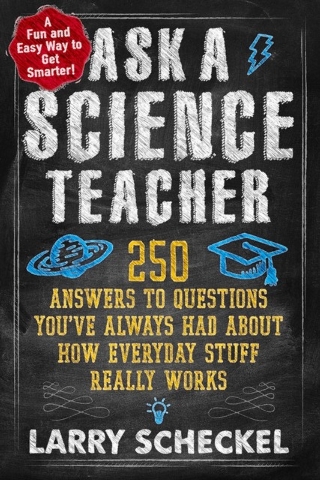‘Ask a Science Teacher’ is a perfect read for curious kids

You love to take things apart.
Whether it’s in your hand or in your mind, it helps to break objects down in order to understand them. You know how something works that way. You see how to make improvements and you learn where the item might be useful elsewhere.
Yep, taking things apart is fun, even though it might make your parents or teachers a little crazy. So maybe you need to read “Ask a Science Teacher” by Larry Scheckel instead. That might be somewhat safer.
Wait … science? Why do you have to study it, anyhow? Isn’t science all about people with thick goggles and lab coats doing experiments?
Lots of students think that way, says Scheckel, but science is a way of “learning about the world around you. …” Understanding it is a great way to understand all the other things you’re interested in knowing, too.
Take, for instance, the great outdoors. Have you ever wondered where the white goes when snow melts? Or, well, it’s been a long winter. How cold could it get? And where does dirt come from?
Let’s say you want to be an architect or a builder someday. Wouldn’t it be cool to know how Legos work? (Hint: it’s not those locking knobs!) Or how lasers cut things without destroying them? Or why ships don’t sink and airplanes stay aloft?
Kids who love animals will love this book. Don’t you wonder why dogs wag their tails when they’re happy, for example? Can you really “talk” with your pet? And which animal is smarter than all the others?
Haven’t you ever wondered why there are no seat belts on your school bus? Or how they get salt into peanuts without breaking the shells? Or, speaking of food, how they know the number of calories in that handful of snacks you’re eating?
And then there’s your favorite subject: YOU!
Why can’t you regenerate missing limbs? Could you really spontaneously combust? What happens (and doesn’t happen) when you sneeze? What if you didn’t have fingernails or fingerprints? Why are people left- or right-handed? And why should you never, ever use your tongue to see if a battery is any good?
So you say your child grouses about having science class, but he’s also plenty curious. He can’t have it both ways — but he can have “Ask a Science Teacher.”
With an engaging Q&A format and a delightfully geeky sense of humor, Scheckel picks apart all sorts of things to see how they work. The topics here are broad, touching upon a wide variety of interests and branches of science, and Scheckel’s musings practically beg to be explored further. I also liked that this book doesn’t have to be read cover-to-cover, but instead can be browsed.
While it’s perfect for curious kids 12 or older, I also think this more-than-merely-science book would keep an adult entertained just as well. If you’re baffled by biology, frustrated by physics or confused over chemistry, “Ask a Science Teacher” will pull it all together.
View publishes Terri Schlichenmeyer’s reviews of books for teens and children weekly.